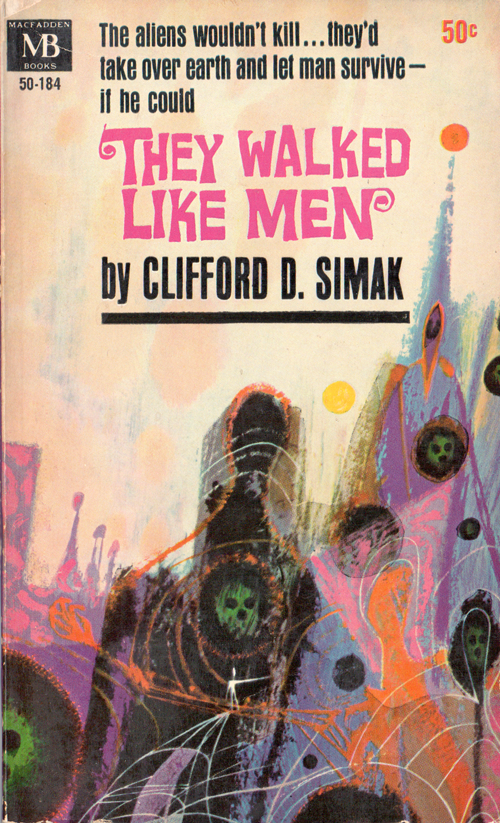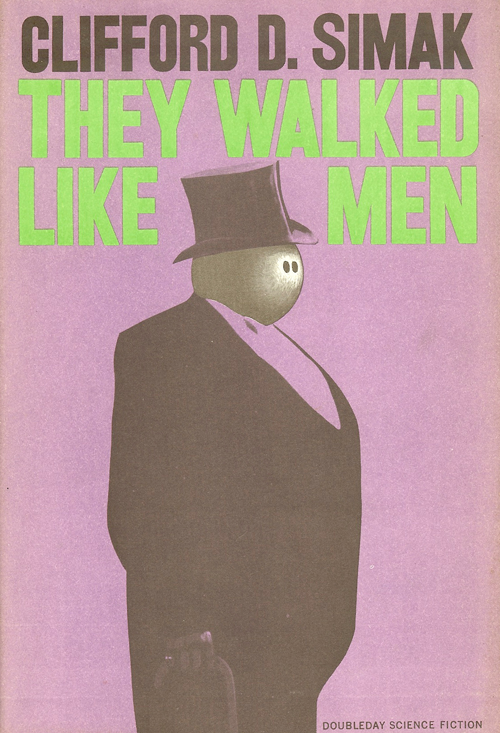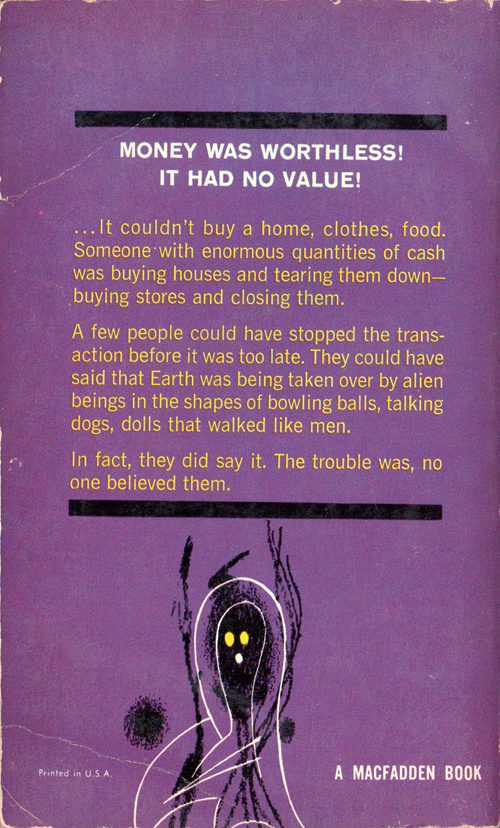They Walked Like Men by Clifford D Simak is one of the most clever alien invasion stories I have ever read. It’s also an exploration of the downsides of private property and capitalism which surprised me from Simak, who doesn’t usually talk about economics in his novels.
Cover artist unknown, MacFadden Books 1963.
This book is written in the first-person POV of Patrick Graves, a science journalist for a city newspaper. The book doesn’t say what year it is but it was published in 1962 and doesn’t have any SF elements other than the aliens. Simak was a journalist so I would guess that he was heavily mining from his experience for the milieu. It makes it more real and offers us a glimpse into a job that doesn’t exist in the same form anymore.
One curious aspect to the setting is that Simak never specifies the name of city in which this story is set. It feels like a mid-sized midwestern city. From his other novels I know that’s where he usually sets his stories because that’s where he lived but it does make some of the phrasing awkward when Simak is trying to dance around naming the city outright. A novelist should pick a place to tell their story and tells us where that place is.
Graves is a bit of a drunk and a misogynist. In many ways Graves exemplifies stereotypes I have about how a typical man in the 1950’s to early 60’s would think about things like drinking and women.
Simak does a terrific job conveying the dread that Graves feel as the alien invasion upends his sense of comfort and normalcy. Here’s a choice quote from page 87 of the 1963 MacFadden Books edition:
Now I saw the great black of the night outside and could sense the coldness and the arrogance that held the world entrapped. The room contracted to a cold place of gleaming light shattering on the shine of the laboratory bench and the sink and glassware, and I was a feebleness that stood there…
As someone who suffers from anxiety and panic attacks, I can testify that this is an accurate description of what it feels like when panic begins.
I won’t spoil the ending but I am going to describe the clever premise. I went into it with no prior knowledge of the plot (I didn’t even read the back cover copy) just a strong appreciation for Simak’s writing and themes (I’ve also reviewed his book The Werewolf Principle) so be forewarned that I’m going into detail about things the book slowly reveals in the following paragraphs.
Cover artist unknown. From Cadwalader Ringgold’s Flickr photostream.
What makes this alien invasion story so ingenious is that there are no looming spaceships, bombed cities, or gunfights. Instead these aliens (who are also perhaps one alien that can subdivide and shapeshift) take over the earth legally, by exploiting a weakness of our capitalist system of private industry, private property, and voluntary exchange.
The aliens buy up private industries and private property but refuse to exchange what they buy for more money. They buy up houses but then don’t sell them so the housing market runs out of empty properties for people to buy. They buy up factories and businesses but then shut them down and don’t open new ones so people run out of jobs. And they do this in such a short amount of time and on such a grand scale that there is no where for anyone to go to find a place to live or a job to work. A truly terrifying scenario that Simak explores with aplomb!
The back cover of They Walked Like Men. Cover artist unknown, MacFadden Books 1963.
These aliens are a metaphor for business owners who only care about money and shareholder value. Simak makes this explicit in the book on page 41 in this quote from an old man who refuses to sell his business to the aliens:
We look on business as a trust and privilege. These others only see it as a way of making money… But so long as we live, we stay here, serving the public as honorably as we can. For I tell you, sir, that business is more than just a counting of the profits. It is a chance for service, a chance to make a contribution.
The world would be a better place if more businesspeople had this perspective.



